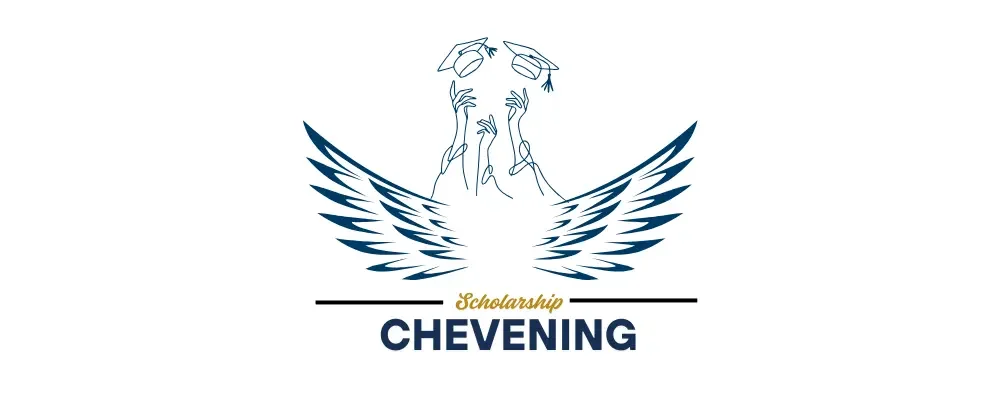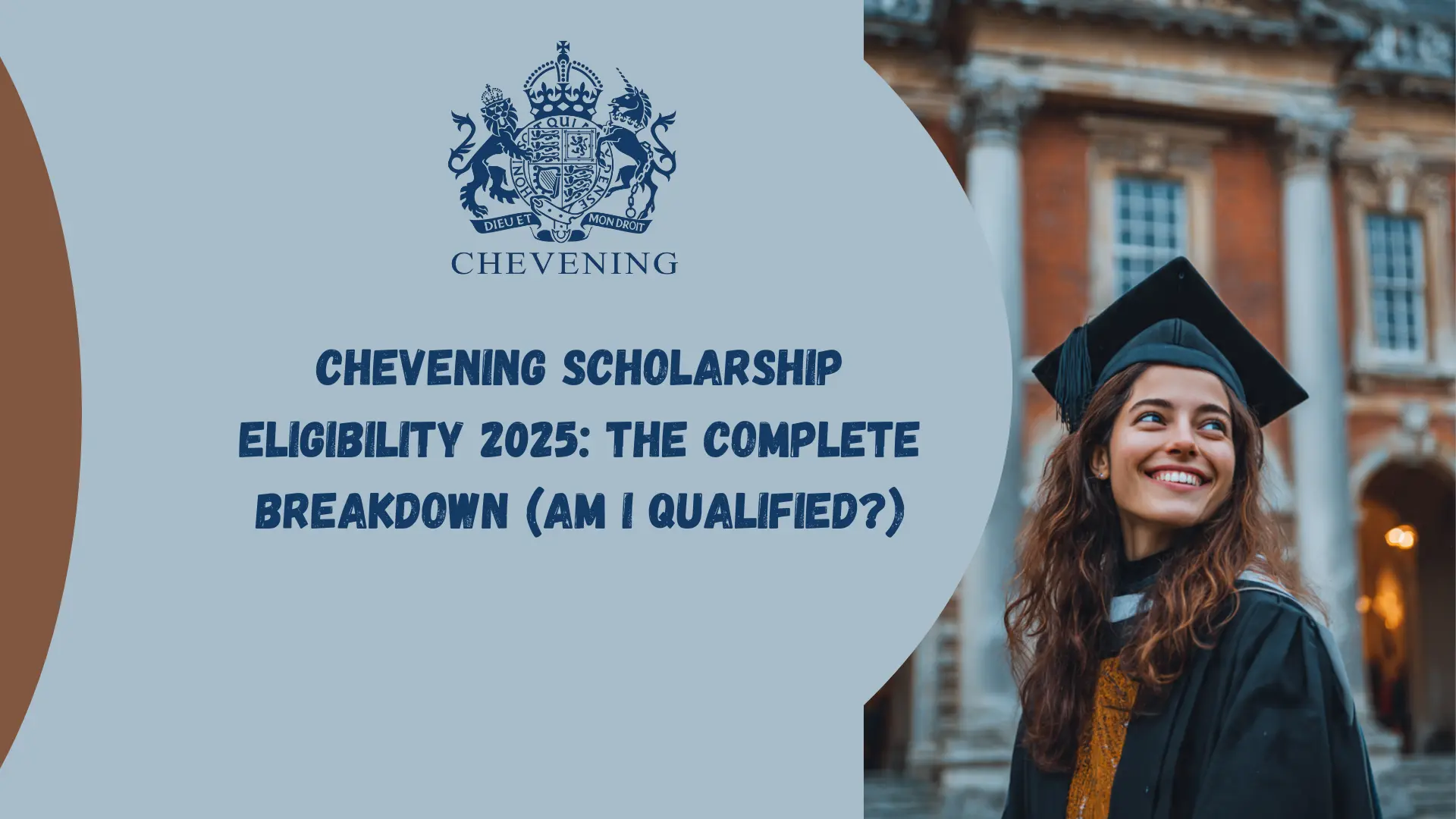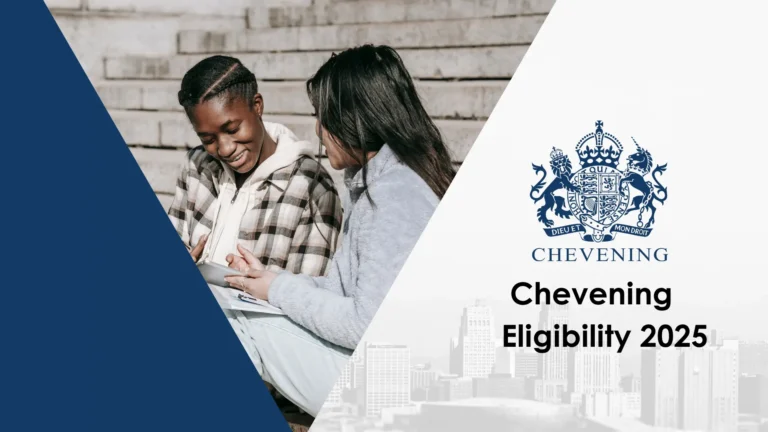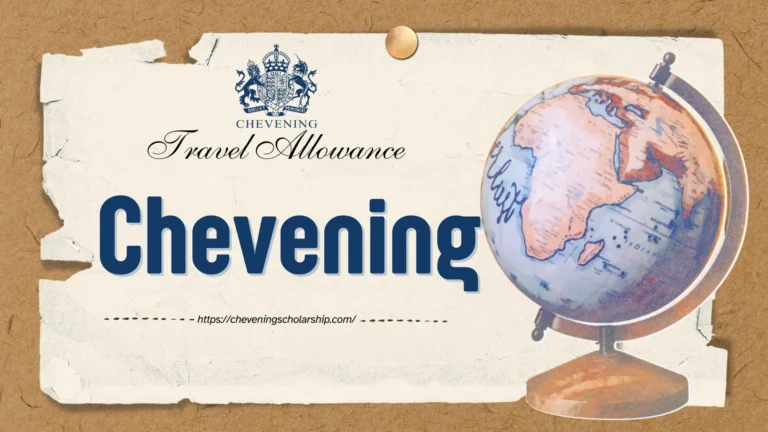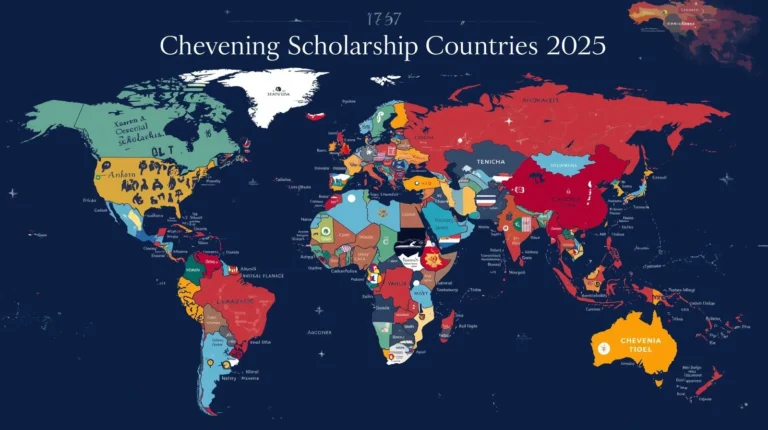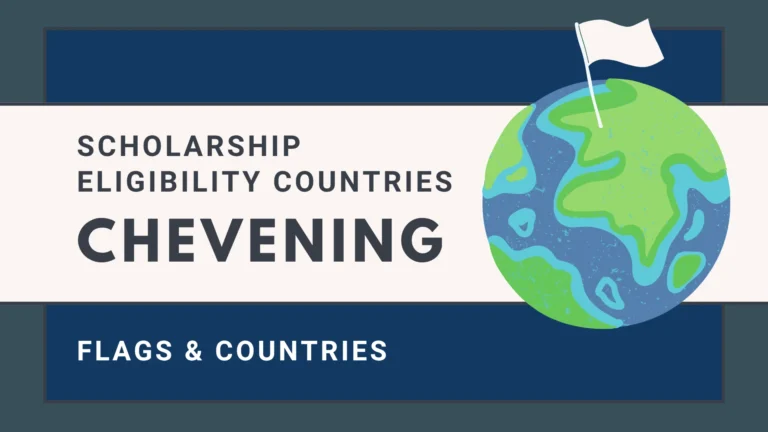Chevening Scholarship Eligibility 2025: The Complete Breakdown (Am I Qualified?)
Sarah spent three weeks on her Chevening application. Perfect essays, glowing references, detailed career plan. She hit submit feeling confident.
Two days later, she got an email: “Unfortunately, you don’t meet the eligibility requirements.”
Turns out, she’d miscalculated her work experience by 200 hours. Those three weeks? Wasted.
Here’s the brutal truth: Chevening scholarship eligibility 2025 is the gatekeeper that stops thousands of hopeful applicants before they even get started. And unlike the subjective parts of the application (essays, interviews), eligibility is black and white. You either qualify or you don’t.
But here’s the good news: once you understand the rules—really understand them, not just skim them—you can avoid Sarah’s heartbreak and focus your energy on the parts of the application that actually matter.
Let’s break down every single eligibility requirement so you know exactly where you stand. No vague explanations. No corporate-speak. Just the straight facts about who can apply for Chevening and who can’t.
What Makes Someone Eligible?
Before we dive into the weeds, let’s zoom out. Chevening eligibility criteria exist for a specific reason: the UK government is investing roughly £30,000-£50,000 per scholar. They want to ensure that investment goes to people who’ll return home and create genuine impact.
The eligibility requirements filter for:
- Citizenship alignment (you’re from a Chevening-eligible country)
- Professional maturity (you have real work experience)
- Academic foundation (you can handle postgraduate study)
- Commitment to return home (you’ll actually go back)
- No duplication (you haven’t already received similar UK funding)
Every requirement ties back to these priorities. Understanding the “why” helps you navigate the “what.”

Requirement #1: Citizenship (The Non-Negotiable Starting Point)
Let’s start with the most straightforward one: Chevening scholarship country eligibility.
Who Can Apply for Chevening?
You must be a citizen of a Chevening-eligible country or territory. As of 2025, this includes over 160 countries worldwide, but the list does change occasionally.
Chevening citizenship requirements are strict:
- You must hold citizenship (not just residency) of an eligible country
- If you have dual citizenship, at least one must be a Chevening-eligible country
- You apply based on your country of citizenship, not where you currently live or work
Country-Specific Eligibility Examples
Chevening scholarship eligibility 2025 Pakistan: Pakistani citizens are eligible and represent one of the largest applicant pools. You must hold Pakistani citizenship and meet all other criteria.
Chevening scholarship eligibility 2025 India: Indian citizens are eligible. India consistently produces high numbers of successful Chevening scholars.
Chevening scholarship eligibility 2025 Nigeria: Nigerian citizens are eligible. Nigeria has one of the most active Chevening alumni communities.
Chevening scholarship eligibility 2025 Bangladesh: Bangladeshi citizens are eligible with strong representation in the program.
Chevening scholarship eligibility 2025 Vietnam: Vietnamese citizens are eligible and encouraged to apply.
| Region | Eligible Countries (Examples) | Notes |
|---|---|---|
| South Asia | Pakistan, India, Bangladesh, Sri Lanka, Nepal | High application volumes |
| Southeast Asia | Indonesia, Philippines, Thailand, Vietnam, Myanmar | Growing Chevening presence |
| Africa | Nigeria, Kenya, Ghana, South Africa, Egypt | Strong alumni networks |
| Middle East | Jordan, Lebanon, Iraq, Palestine, Yemen | Some country-specific programs |
| Latin America | Mexico, Brazil, Colombia, Peru, Argentina | Smaller but growing cohorts |
| Caribbean | Jamaica, Trinidad & Tobago, Barbados | Regional collaboration programs |
The Tricky Cases
Chevening scholarship eligibility UK nationals: No. UK citizens and British nationals (overseas) are not eligible for Chevening. This scholarship is specifically for international students.
Dual citizenship: If you hold dual citizenship and one country is UK/USA/EU/Australia/Canada/New Zealand, you typically cannot apply. Check the specific rules—they’re strict about this.
Refugees and stateless persons: Chevening eligibility for refugees depends on your specific situation. If you’re a recognized refugee with official documentation, you may be eligible. Contact your local British embassy for clarification.
Chevening scholarship eligibility for international students currently in UK: Yes, you can apply even if you’re currently studying in the UK, as long as you meet all other eligibility criteria and will return home after your Chevening scholarship ends.
Requirement #2: Work Experience (Where Most People Trip Up)
This is where things get complicated. Chevening work experience criteria cause more confusion than any other eligibility requirement.
The Official Rule: 2,800 Hours Minimum
You need at least 2,800 hours of work experience by the time applications close (typically early November). That’s roughly equivalent to:
- 2 years full-time work (40 hours/week for 2 years = 4,160 hours)
- 3 years at 20 hours/week
- 4 years at 15 hours/week
- Any combination that reaches 2,800 hours
Chevening eligibility minimum hours is non-negotiable. 2,799 hours? Not eligible. You need to hit that threshold.
What Counts as Work Experience?
DOES count:
- Full-time employment
- Part-time employment
- Paid internships
- Self-employment/freelancing
- Volunteer work (yes, unpaid work counts!)
- Teaching assistantships if you were employed
- Research positions if you were employed
DOES NOT count:
- Academic coursework (even if demanding)
- Unpaid undergraduate research projects
- Student organization leadership
- University clubs or societies
- Personal projects or hobbies
Chevening criteria work experience must involve some form of employment relationship or structured volunteering, even if unpaid.
How to Calculate Your Hours Correctly
This is critical. Get this wrong and your application is dead on arrival.
Step 1: List every position you’ve held since completing your undergraduate degree Step 2: For each position, calculate: (hours per week) × (number of weeks) Step 3: Add them all together Step 4: Ensure you’re at or above 2,800 hours.
| Position | Hours/Week | Duration | Total Hours | Counts? |
|---|---|---|---|---|
| Full-time job | 40 | 2 years (104 weeks) | 4,160 | ✓ Yes |
| Part-time job | 20 | 1.5 years (78 weeks) | 1,560 | ✓ Yes |
| Paid internship | 35 | 6 months (26 weeks) | 910 | ✓ Yes |
| Volunteer position | 15 | 1 year (52 weeks) | 780 | ✓ Yes |
| Undergraduate TA | 10 | 2 semesters (30 weeks) | 300 | ✓ If paid |
| Student club president | 10 | 1 year (52 weeks) | 520 | ✗ No |
| Personal blog/project | 20 | 1 year (52 weeks) | 1,040 | ✗ No |
Special Cases
Chevening eligibility without work experience: Sorry, but no. The 2,800-hour requirement is absolute. If you’re still accumulating hours, wait until you qualify before applying.
Gap years and unemployment: Gaps in employment don’t disqualify you, as long as your total accumulated hours meet the threshold.
Multiple part-time positions: You can combine hours from simultaneous part-time jobs. If you worked 20 hours/week at Job A and 15 hours/week at Job B during the same period, that’s 35 hours/week total.
Self-employment: This counts, but you’ll need to provide documentation (tax records, contracts, invoices) to prove it.
Requirement #3: Academic Qualifications
Chevening undergraduate degree requirement is straightforward: you need a bachelor’s degree or equivalent that qualifies you for postgraduate study in the UK.
What Qualifies?
Acceptable qualifications:
- Bachelor’s degree (BA, BSc, BEng, etc.)
- Undergraduate degree equivalent in your country’s system
- 4-year bachelor’s degree (common in US, Canada, Philippines)
- 3-year bachelor’s degree (common in UK, India, Pakistan, most of Europe)
- Professional degrees like MBBS if equivalent to bachelor’s level
Chevening scholarship academic eligibility requires that your degree would allow admission to a UK master’s program. Most UK universities consider a bachelor’s degree with at least second-class honors (or equivalent) as the minimum.
Can You Apply If…?
You’re currently completing your undergraduate degree? No. You must have graduated before the application deadline.
You already have a master’s degree? Chevening eligibility with master’s degree: Yes! You can apply even if you already have a master’s degree, as long as you meet all other criteria.
Chevening eligibility with second masters: Absolutely fine. Chevening doesn’t restrict applicants who already have postgraduate degrees.
You have a PhD? Chevening eligibility with PhD: Yes, you can still apply for a master’s degree through Chevening, though you’ll need to articulate clearly why this specific master’s program fills a gap in your expertise.
Your degree is from a non-UK institution? That’s fine—most Chevening scholars have degrees from their home countries. You may need to provide an equivalency certificate from NARIC or ECCTIS showing your degree is equivalent to a UK bachelor’s degree.

Requirement #4: English Language Proficiency
Chevening English language requirements are somewhat flexible because they’re ultimately determined by the UK universities you apply to, not by Chevening itself.
What You Need to Know
For the Chevening application: You don’t need to provide English test scores when you initially apply. Your essays demonstrate your English proficiency.
For university admission: You’ll need to meet each university’s specific English language requirements, typically:
- IELTS Academic: 6.5-7.0 overall (varies by university and program)
- TOEFL iBT: 90-100 (varies)
- PTE Academic: 60-70 (varies)
- Cambridge English: Advanced or Proficiency
Exemptions: You may be exempt from English testing if:
- You completed your undergraduate degree in English
- You’re from a majority English-speaking country
- You’ve worked in an English-speaking environment for several years
Check individual university requirements—they vary significantly.
Chevening scholarship eligibility for international students without IELTS: You can submit your Chevening application without IELTS scores, but you’ll need them later for university admission. Plan accordingly.
Requirement #5: Return Home Commitment
This is huge. Chevening return home requirement isn’t just a box to check—it’s a binding commitment.
What This Means in Practice
After completing your Chevening scholarship, you must return to your country of citizenship for a minimum of two years. Not negotiate—return. You’ll sign an agreement to this effect.
This isn’t about the UK government being controlling. It’s about ensuring the investment in your education benefits your home country, which is the entire point of Chevening.
The Rules Are Strict
- You cannot apply for UK work visas immediately after graduating
- You cannot extend your stay in the UK beyond your scholarship period (except for brief travel)
- You must be physically present in your home country for at least 2 years
- Violation of this commitment can result in being required to repay the full scholarship amount
Can You Visit the UK During the 2-Year Period?
Yes. You can visit for conferences, short courses, holidays, etc. You just can’t live or work there.
What Happens After 2 Years?
After fulfilling your 2-year return commitment, you’re free to apply for jobs anywhere in the world, including the UK.
Requirement #6: Previous UK Government Funding
Here’s one that catches people off guard: if you’ve previously studied in the UK on a UK government-funded scholarship, you’re generally not eligible for Chevening.
Chevening eligibility with previous UK scholarship: If you received a UK government scholarship (like Commonwealth Scholarship, Marshall Scholarship, etc.) to study in the UK before, you typically cannot apply for Chevening.
Exception: If you received a short course scholarship (under 3 months), you may still be eligible. Check with your local British embassy.
Requirement #7: Not Currently Employed by UK Government
If you’re currently working for the UK government, British embassies, or related organizations, you may not be eligible. This includes:
- British embassy or high commission staff
- British Council employees
- Certain diplomatic positions
Check the specific restrictions—there are nuances based on your role.
The Age Question (Or Lack Thereof)
Chevening scholarship age eligibility: There is no age limit for Chevening applicants.
As long as you meet all other requirements, you can apply whether you’re 23 or 53. That said, most successful applicants tend to be in their late 20s to early 40s, simply because that’s when people typically have the required work experience and are at career stages where a UK master’s degree provides maximum impact.
Chevening scholarship age limit: Officially none. Practically, focus on demonstrating how the scholarship fits your current career stage, regardless of age.
Country-Specific Variations and Special Programs
While most eligibility criteria are universal, some countries have additional considerations:
Chevening Fellowship Programmes
Some countries offer Chevening Fellowships in addition to regular Chevening Scholarships. These are typically shorter programs (3-6 months) with different eligibility criteria.
Regional Partnerships
Certain regions have partnership programs with additional funding sources (like Chevening-ASEAN, Chevening-African Union). These may have slight variations in eligibility.
Chevening Country Eligibility Lists Change
The Chevening scholarship country eligibility list is reviewed annually. Countries can be added or removed based on diplomatic relationships and funding availability. Always check the current year’s official list.
How to Verify Your Eligibility (Step-by-Step)
Let’s make this practical. Here’s how to definitively determine if you’re eligible:
Step 1: Citizenship Check
Go to the official Chevening website and check the current year’s list of eligible countries. Is your country listed?
✓ Yes → Continue ✗ No → Unfortunately, you’re not eligible this year
Step 2: Work Experience Calculation
Calculate your total work hours since completing your undergraduate degree.
Total hours ≥ 2,800?
✓ Yes → Continue ✗ No → Wait until you accumulate sufficient hours
Step 3: Education Verification
Do you have a completed bachelor’s degree or equivalent?
✓ Yes → Continue ✗ No → Wait until you complete your degree
Step 4: Previous UK Funding Check
Have you studied in the UK previously on a UK government scholarship?
✗ No → Continue ✓ Yes → Check if your previous scholarship creates ineligibility
Step 5: Return Commitment
Are you willing and able to return to your home country for 2 years after the scholarship?
✓ Yes → Continue ✗ No → Chevening may not be the right fit.
Step 6: Current Employment Check
Are you currently employed by the UK government or related organizations?
✗ No → You’re eligible! ✓ Yes → Check specific restrictions.
Common Eligibility Mistakes (And How to Avoid Them)
Let’s talk about Chevening scholarship eligibility rejected scenarios—the mistakes that disqualify otherwise strong candidates.
Mistake #1: Miscalculating Work Hours
The error: Including academic projects or student activities in work hour calculations.
The fix: Only count employment (paid or structured volunteer work). When in doubt, don’t count it.
Mistake #2: Applying from Wrong Country
The error: Dual citizens applying from an ineligible country or trying to “game” the system by using a passport they don’t actually use.
The fix: Apply based on the country where you have genuine ties and plan to return.
Mistake #3: Ignoring the Return Requirement
The error: Applying while planning to migrate permanently, thinking they can negotiate later.
The fix: Only apply if you’re genuinely committed to returning home for 2 years. The rules are enforced.
Mistake #4: Submitting Before Completing Degree
The error: Applying while still completing undergraduate studies, assuming graduation before the scholarship starts is sufficient.
The fix: You must have graduated before the application deadline. Period.
Mistake #5: Not Checking Annual Updates
The error: Assuming eligibility criteria remain unchanged from previous years.
The fix: Check the official Chevening website each application cycle. Chevening eligibility guidelines update annually, and small changes can affect your eligibility.
Special Situations: Gray Areas Explained
Some eligibility questions don’t have black-and-white answers. Let’s address the most common:
“I’m Currently Working Abroad—Am I Still Eligible?”
Yes, as long as you’re a citizen of a Chevening-eligible country and can return home after the scholarship. Living abroad doesn’t disqualify you.
“My Degree Is Not Recognized—What Do I Do?”
Get a degree equivalency evaluation from NARIC or ECCTIS. These organizations assess international qualifications and determine UK equivalency. Budget 2-4 weeks and approximately £50-£200 for this service.
“I’m Self-Employed—How Do I Prove Work Experience?”
Provide tax records, invoices, contracts, client testimonials, or any documentation showing you’ve been operating a business or working as a consultant. The key is demonstrating legitimate, sustained work activity.
“Can I Apply If I’m Currently on Another Scholarship?”
It depends on your current scholarship’s terms. Some scholarships prohibit applying for other funding while enrolled. Check your current scholarship agreement. For Chevening purposes, the key question is whether you’ve previously studied in the UK on UK government funding, not whether you’re currently on a different scholarship.
“What If I Complete My Required Work Hours After Submitting?”
You must meet all eligibility criteria by the application deadline. You can’t submit with 2,600 hours and accumulate the final 200 hours after deadline.
Testing Your Eligibility: The Unofficial Quiz
Want a quick check? Answer these questions:
- Are you a citizen of a Chevening-eligible country? (Y/N)
- Do you have at least 2,800 hours of work experience? (Y/N)
- Have you completed your undergraduate degree? (Y/N)
- Are you willing to return home for 2 years after the scholarship? (Y/N)
- Have you previously studied in UK on UK government funding? (Y/N – should be No)
- Are you currently employed by UK government? (Y/N – should be No)
If you answered correctly to all six (Y, Y, Y, Y, N, N), you’re likely eligible!
If you answered incorrectly to any, review that specific requirement section above to understand your situation better.
Note: This is an informal assessment. For official eligibility verification, always consult the Chevening website and your local British embassy.
What to Do Once You Confirm Eligibility
So you’re eligible—congratulations! Now what?
Immediate Next Steps
Document everything: Gather proof of work experience (employment letters, contracts, pay slips), degree certificates, transcripts, and passport.
Start planning: Even if the application window isn’t open yet, begin drafting essays and thinking about university choices.
Connect with alumni: Join Chevening applicant communities online. Learn from those who’ve successfully navigated the process.
Mark your calendar: Application deadlines are typically early November. Set reminders for early September to begin your serious application work.
Long-Term Preparation
Build stronger experience: If you’re barely meeting the 2,800-hour threshold, continue gaining experience. More experience = stronger application.
Develop leadership examples: Start documenting your leadership experiences now. Keep a journal of projects, challenges, and outcomes.
Research universities: Don’t wait until after you’re accepted. Strong university choices strengthen your entire application.
Improve English if needed: If English isn’t your first language, consider taking preparation courses for IELTS or TOEFL now.
The Bottom Line: Are You Qualified?
Here’s the reality check: Chevening scholarship eligibility is the easy part. Meeting the requirements doesn’t guarantee success—it just gets you through the door.
Thousands of eligible candidates apply. Only about 2% win scholarships.
But here’s the thing: you can’t win if you don’t qualify. So before you invest weeks into essays and applications, take 30 minutes to thoroughly verify your eligibility.
Use the checklist above. Calculate your work hours honestly. Check the country list. Make sure you can commit to returning home.
If you meet all requirements? Amazing. Now the real work begins—crafting an application that stands out from thousands of other qualified candidates.
If you don’t quite meet requirements yet? That’s okay. Set a timeline for when you will meet them, and start preparing now so you’re ready when your eligibility window opens.
Your Action Plan Right Now
In the next hour:
- Check if your country is on the current Chevening-eligible list
- Calculate your total work experience hours
- Verify you have a completed bachelor’s degree
- Confirm you can commit to the 2-year return requirement
In the next week:
- Gather documentation proving your work experience
- Obtain official copies of your degree certificates
- Check if you need degree equivalency evaluation
- Join online Chevening applicant communities
In the next month:
- If eligible, start researching UK universities and programs
- Begin drafting application essays (even if portal isn’t open)
- Identify potential referees
- Set up timeline for completing your application
Final Thoughts: Eligibility Is Just the Beginning
Look, I’m going to be straight with you. Confirming you’re eligible for Chevening feels like an achievement, but it’s actually just clearing the minimum bar.
It’s like qualifying for a marathon. Yes, you had to train and meet certain standards. But qualifying doesn’t mean you’ve run the race—it means you get to show up at the starting line with thousands of other qualified runners.
The real competition happens after eligibility is confirmed.
But none of that matters if you don’t qualify in the first place. So take this seriously. Do the math. Check the lists. Be honest about whether you meet the requirements.
Sarah, from our opening story? She applied again the next year after accumulating the missing work hours. She won.
Not because she was smarter or more impressive than other candidates. But because this time, she was actually eligible—and she’d learned from her mistake.
Don’t be first-year Sarah. Be second-year Sarah.
Verify your eligibility. Do it right. Then focus your energy on the parts that actually matter.
Critical Note: Eligibility criteria can change from year to year. Always verify current requirements on the official Chevening website (www.chevening.org) and consult with your local British embassy if you have questions about your specific situation. This guide is based on 2025 criteria and provides strategic guidance, but official sources have final authority.
Good luck with your application.
